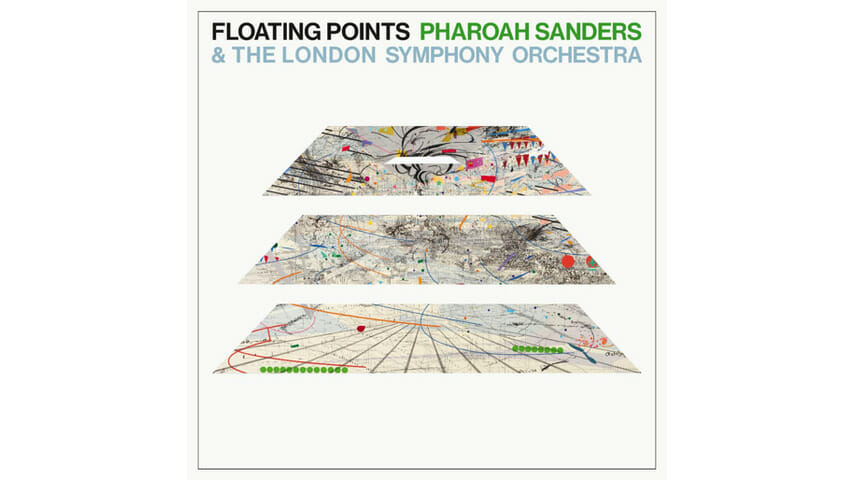Consider the pull of the cross-generational collaboration album. When it’s bad, it’s very bad—think Lou Reed and Metallica huffing the fumes of 19th-century German theater on 2011’s Lulu, or Miley Cyrus sloshing around in psych-rock cosplay on 2015’s Flaming Lips-produced Miley Cyrus and Her Dead Petz. But when it works, the results can be pleasantly odd (Elvis Costello and The Roots’ Wise Up Ghost) or downright revelatory (Cocteau Twins and Harold Budd’s The Moon and the Melodies, Neil Young’s Pearl Jam-assisted Mirror Ball).
This unlikely pairing of British electronic wiz Sam Shepherd, aka Floating Points, and free-jazz saxophone titan Pharoah Sanders is among the most revelatory match-ups in recent memory. On their long-simmering album Promises, which also features the cinematic swells of the London Symphony Orchestra, the musicians’ collaborative energy proves as remarkably potent as it is improbable. Unfurling in one continuous, wordless composition split into nine movements, Promises sounds like a leap of creative faith, a cosmic communion that reaches across generations, genres and musical barriers to build something beautiful.
Its origin story dates back more than half a decade. In 2015, Sanders, then in his mid-70s, was in a rental car when he heard Floating Points’ debut album, Elaenia. Impressed, he soon befriended the electronic composer more than 40 years his junior; they would meet for lunch and talk about jazz, and eventually, Sanders proposed they create a joint album. The result—primarily recorded in Los Angeles during the summer of 2019, with orchestral parts recorded during the pandemic one year later—is Sanders’ first album of his own in more than 10 years.
Sanders is known for his frenzied soloing and furious “sheets of sound,” particularly during his years as a John Coltrane sideman, and on his own avant-jazz masterpieces Karma and Black Unity, but here he plays with enviable restraint and grace, carving out breathtaking melodic figures in the open spaces between Shepherd’s pillows of sound. As for Shepherd, he contributes piano, harpsichord, organ and electronic elements, but his contributions are so minimalist as to veer towards ambient territory rather than electronica. There are few traces of the skittering drum programming and grinding modular synths that filled up Floating Points’ most recent solo album, 2019’s Crush.
The piece centers around an interlocking sequence of harpsichord arpeggios, constantly mutating but never fading from the mix, at least until around “Movement 8.” For 46 dreamlike minutes, Sanders’ saxophone is engaged in a kind of creative conversation with those featherweight particles of sound. It’s up to Sanders and the London Symphony Orchestra to bring a continuously fluctuating intensity to the piece, and they do, particularly around “Movement 6,” when the strings seem to overpower the saxophone with searing and dramatic crescendos. By the seventh movement, the core duo takes center stage again, drifting towards a more abstract psychedelia. There are several false endings; only the ninth and final movement, a kind of hovering string coda, feels superfluous.
When played without interruption and afforded the patience (and quality speakers) it demands, Promises is the kind of album that can rearrange the molecules in a room. It can imbue your drab apartment with a vast, cinematic weight. It can kill a party (this is admittedly speculative) in the best possible way. It can fill up the space while you wash dishes, put away laundry or water plants, infusing any mind-numbing household activity with a mist of supernatural yearning.
Sanders, a “spiritual jazz” pioneer, is not a stranger to this transcendent approach to experimental jazz, but it’s a pleasure to hear him still pushing himself forward, still seeking the unknown, more than half a century removed from Karma. There’s a timeless quality to Promises, an inscrutable sense that the album could hail from 30 years in the past or 30 years into the future. Of course, that’s what makes it a genuine intergenerational collaboration, this sense of time collapsing upon itself. It’s in the empty space between these two vastly different generations, eras and creative disciplines that something remarkable unfolds.
Zach Schonfeld is a freelance writer and journalist based in New York. He contributes regularly to Paste, Pitchfork, Vulture and other publications. Previously, he was a senior writer for Newsweek. His first book was published in November 2020.
